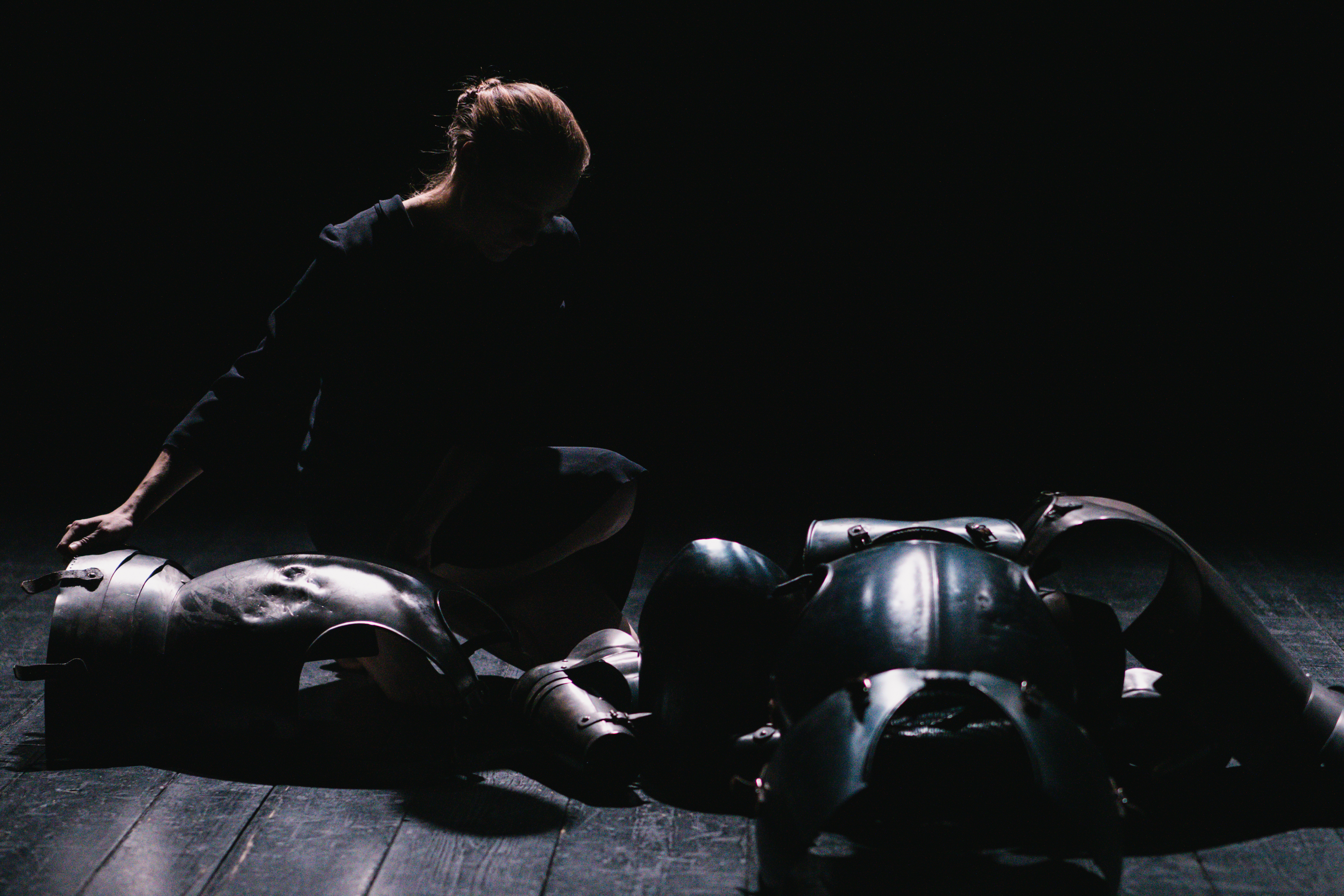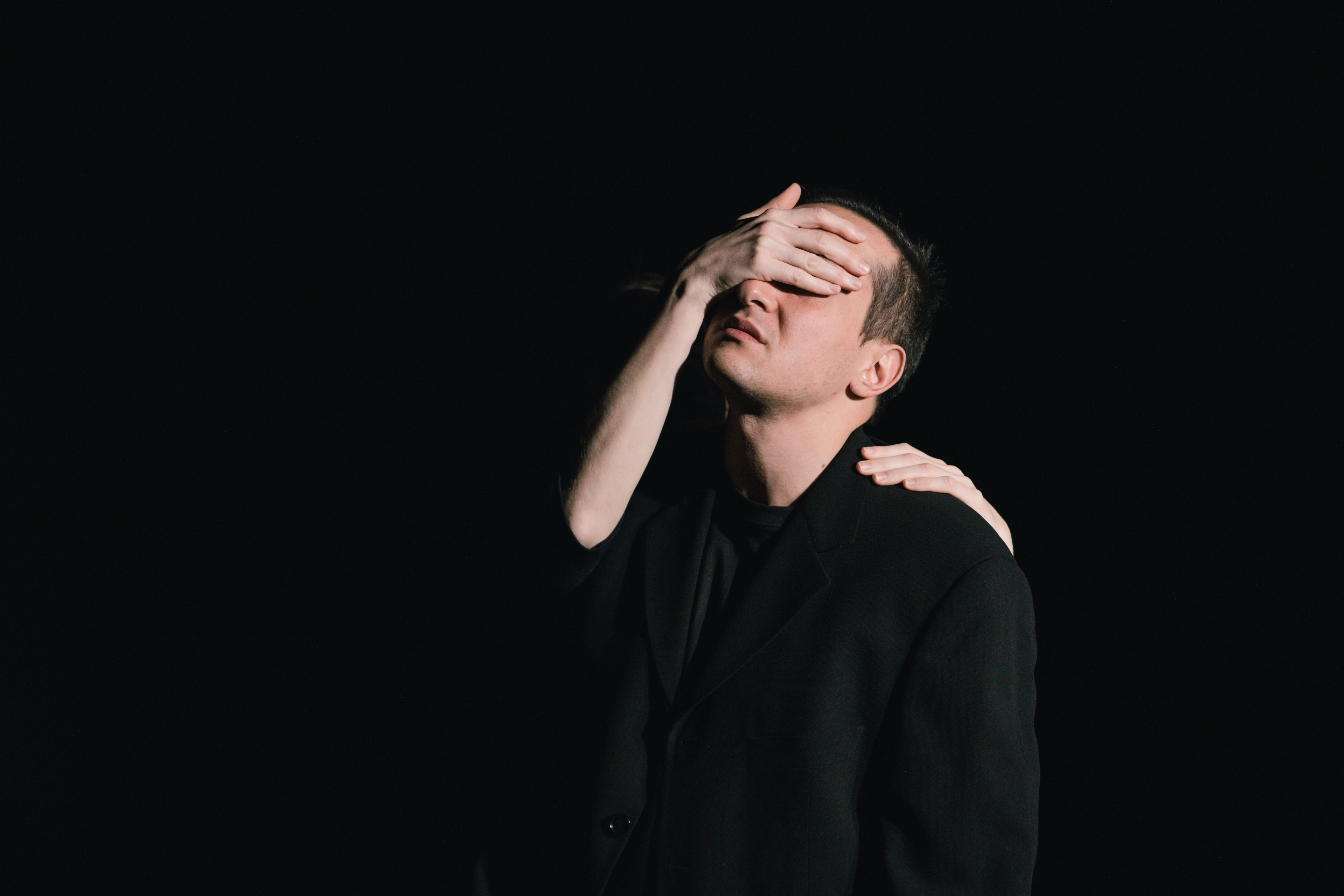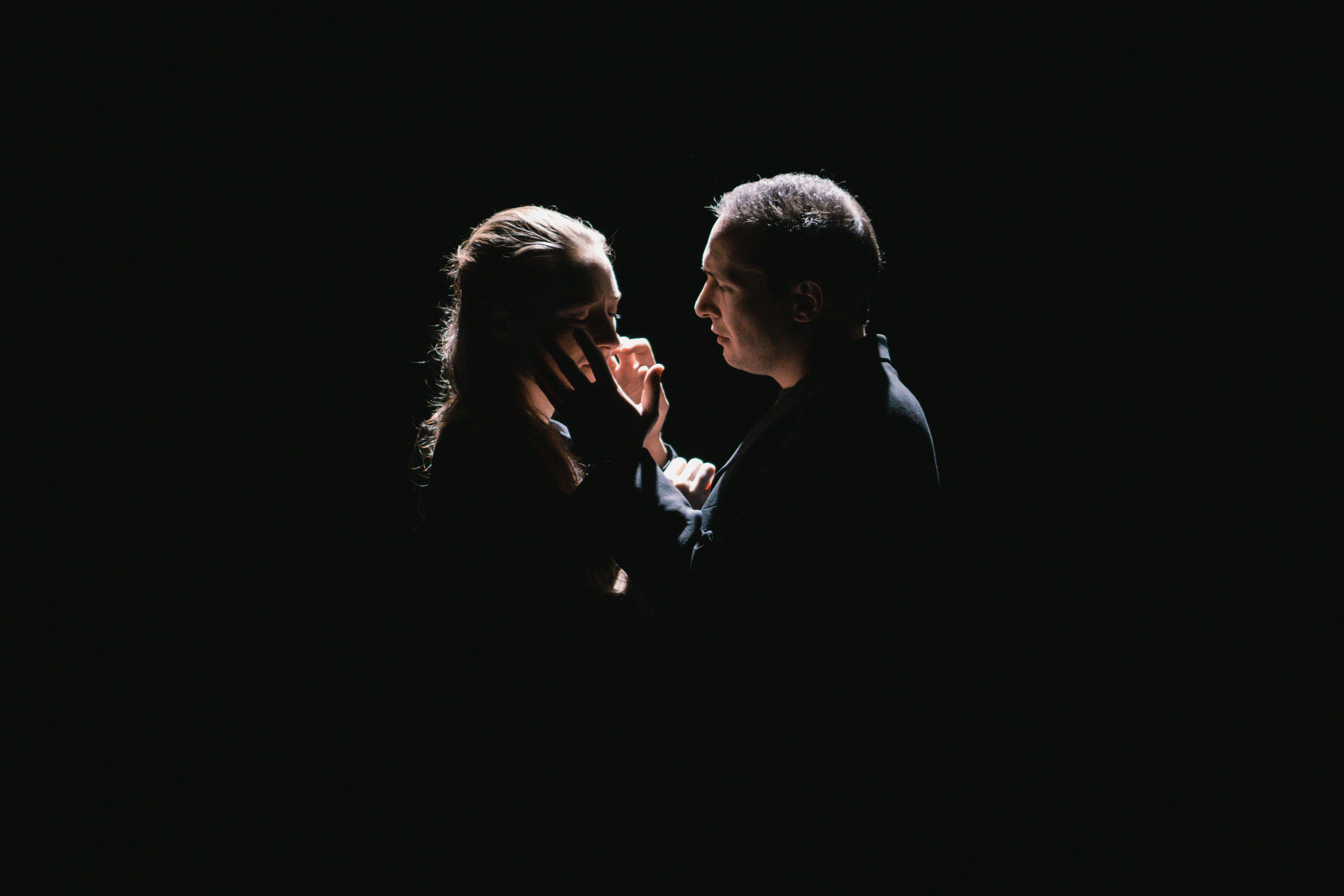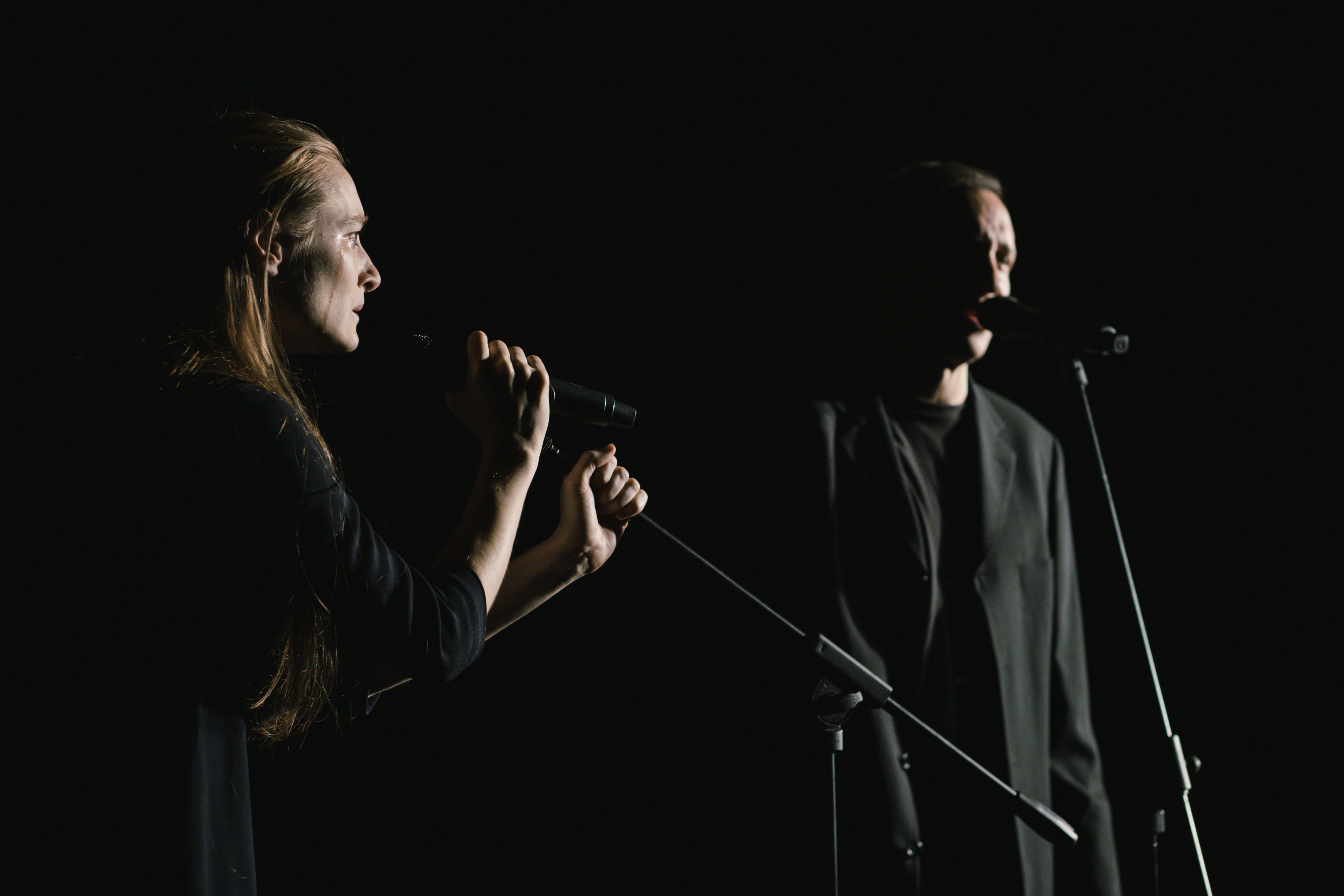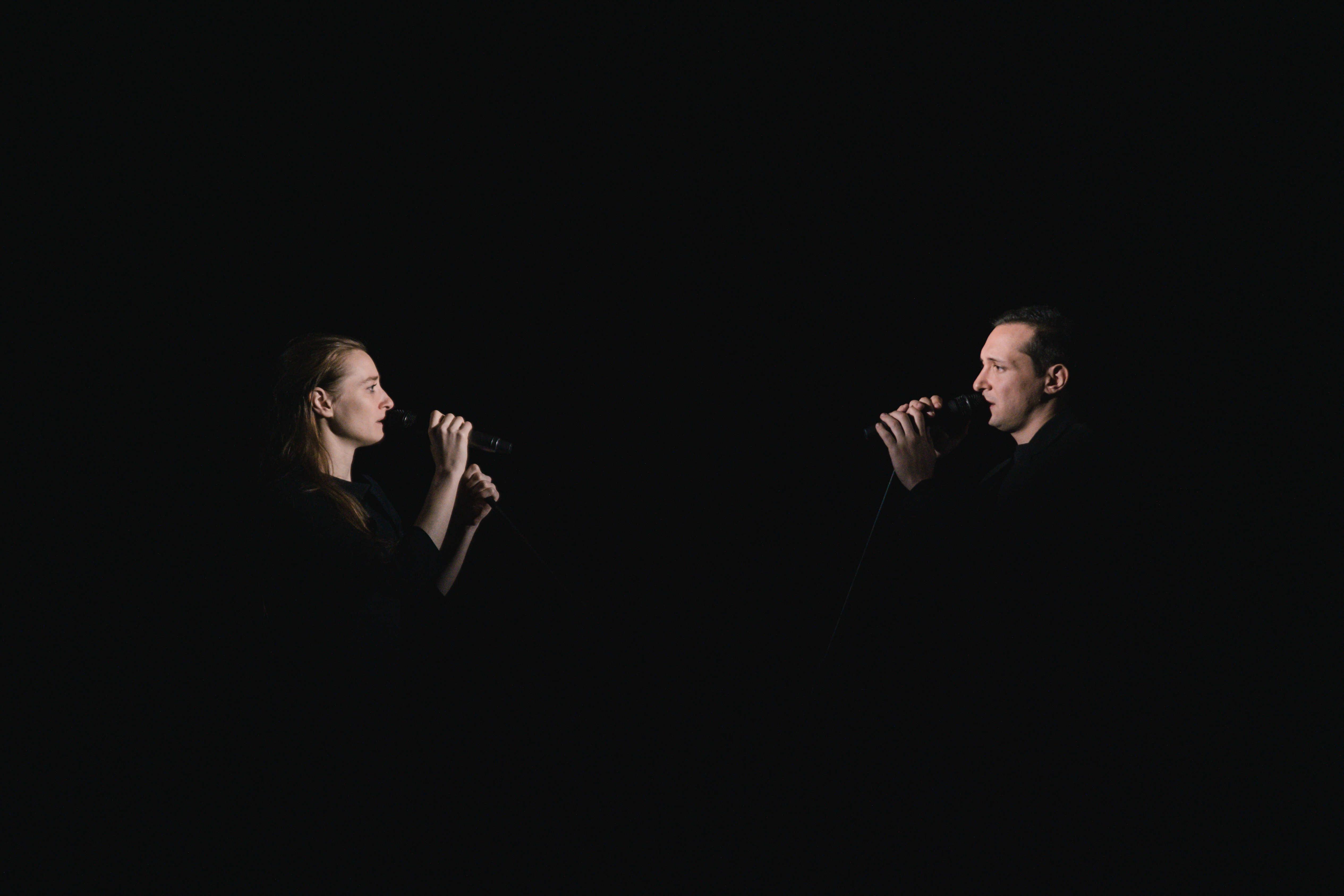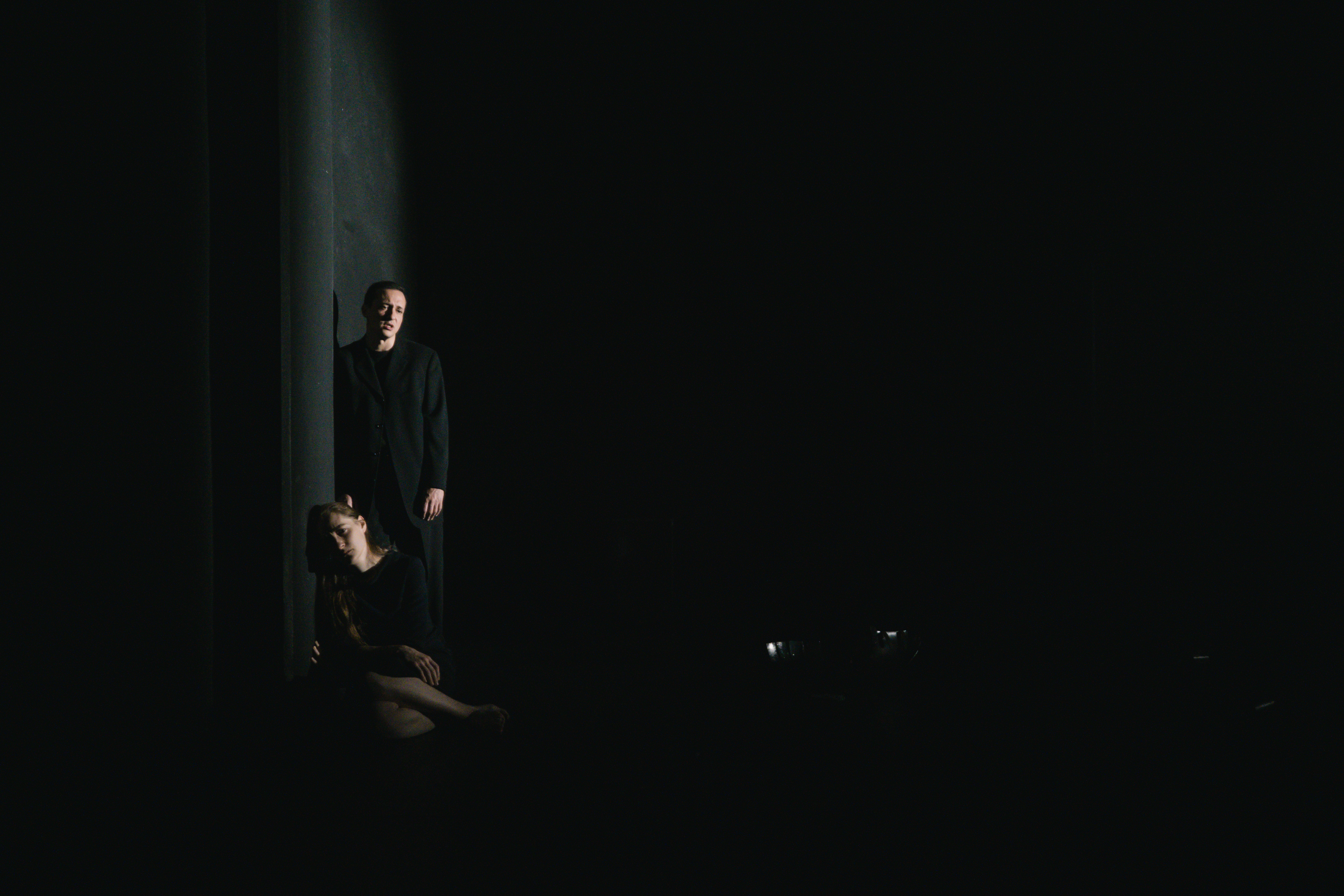Premiére: Fabbrichino – Teatro Metastasio (Prato), 8 Novembre 2022
di Riccardo Favaro e Giovanni Ortoleva
liberamente tratto da Chretien de Troyes e Sir Thomas Malory
regia di Giovanni Ortoleva
musiche di Pietro Guarracino
con Leda Kreider e Edoardo Sorgente
produzione Fondazione Teatro Metastasio di Prato
in collaborazione con Kanterstrasse, Capotrave/Kilowatt, Olinda
foto di scena Giulia Lenzi
Quando pensiamo ai romanzi cavallereschi la nostra mente viene affollata da corazze, scudi, stendardi. Vediamo pesanti armature venire montate sui cavalli dagli stallieri, imbracciare lance di legno e sfidarsi a duello in nome di una dama distante. Sentiamo il rumore del loro cozzare riempire le foreste di un’Europa mitica, ancora piena di boschi. Quando pensiamo ai cavalieri dimentichiamo, sistematicamente, la loro carne. La carne che vive dentro le armature. La carne che tanti colpi prende, si lacera, ribolle alla vista della propria dama e gronda di sangue dopo un torneo. Questa è uno spettacolo sulla carne.
In uno dei miti più noti del ciclo bretone, Ginevra, moglie di Artù, e Lancillotto, il più valente cavaliere del Re, cadono preda di un amore che porterà a scontri intestini e lotte fratricide, fino alla tragica caduta del regno. In seno alla cultura cortese nasce una storia che celebra il tramonto della tavola rotonda, come un cane che si morde la coda: è proprio il tanto decantato amore, spesso al centro delle prove affrontate dai cavalieri di Artù, a decretare la sua fine.
Setacciando gli ampi materiali che formano il ciclo arturiano e gli circolano intorno, da Chretien de Troyes a sir Thomas Malory, da Dante Alighieri a Robert Bresson, Giovanni Ortoleva e Riccardo Favaro attraversano il mito e ne compiono una riscrittura essenziale, capace di far intravedere attraverso la vicenda dei due amanti l’affresco di un mondo in rapido cambiamento.
Nella loro infinita, incolmabile distanza dal mondo reale, i romanzi cortesi parlano ad ogni epoca facendo riflettere su ciò che in essi si trova e che nella realtà manca. Non possiamo sapere che effetto facessero su chi li ascoltasse nella prima parte dello scorso millennio, ma a colpirci oggi non sono tanto gli animali fantastici o gli incantesimi quanto il mondo ideale dei cavalieri, la loro condivisione di valori per cui morire. Oggi la tavola rotonda, la cui forma indicava che nessuno poteva esserne il vertice, è più inimmaginabile degli ippogrifi. Se è vero, come dice Denis De Rougemont, che l’Occidente si fonda sull’idea di amore descritto nei romanzi cortesi, viene naturale chiedersi come ha fatto a perdere tutto il resto che si trova in quelle pagine.
A questo proposito, proprio la storia di Lancillotto e Ginevra è cruciale. Quando la moglie di Re Artù e il suo cavaliere più valoroso avviano la loro relazione clandestina stanno mettendo in moto il processo che porterà alla fine del regno di Artù. Stanno decidendo, o non stanno riuscendo ad evitare, di distruggere la tavola rotonda. Stanno scegliendo l’amore al posto degli ideali. Stanno scegliendo per noi.
Giovanni Ortoleva
PRESS
“Una versione originale di Lancillotto e Ginevra, dalla bella drammaturgia.”
Anna Bandettini, La Repubblica
“Avvolto nella penombra di una pensosa oscurità, il Fabbrichino, dove lo spettacolo ha felicemente debuttato, […], è uno spazio mentale, una radura mistica. Una vertigine fiabesca che i due amanti, scacciati come Adamo ed Eva dal paradiso delle convenzioni, dei nobili sentimenti, luttuosamente vestiti, dilaniati dai rimorsi e afflitti dai sensi di colpa, partendo da Chretien de Troyes increspano di parole e sentimenti, un vortice di sussurri e grida, testimoni principi e artefici massimi del fallimento della missione cavalleresca.”
Gabriele Rizza, Il Manifesto
“Palcoscenico vuoto anche in Lancillotto e Ginevra, immerso in buio e tenebre squarciati da fenditure di luce, oscuro sarcofago a contenere i tormenti dei due amanti e pochi frammenti di armature (queste sì rilucenti) abbandonati a terra. Oscurità con qualche bagliore, come oscuro con qualche bagliore è l’inconscio. […] Del resto tra il regista Ortoleva e l’interprete Sorgente il sodalizio risale ai tempi dell’apprendimento artistico alla Scuola Paolo Grassi, e in Lancillotto e Ginevra hanno vinto forse la sfida più complessa e ardua. Basti dire che insieme son riusciti a dare un senso espressivo anche agli scricchiolii delle scarpe di vernice.”
Sandro Avanzo, Spettacoli News
“La coppia [Leda Kreider ed Edoardo Sorgente] trascina il pubblico in profondità e anche oltre, in una caduta che è volo verso l’ultra baritonale, il viscerale. […] Si ha spesso la sensazione di stare sotto al palco di un club ad ascoltare un gruppo post rock, emisfero da cui Lancillotto e Ginevra mutua la convivenza tra suoni preprodotti ed esibizione dal vivo, con l’elemento umano che si lacera sopra alla ripetitività monolitica dei campionatori. La musica è parte della drammaturgia, ma nel contempo la contiene, rispecchiandone la tonalità autoriale: una tensione al “post”, del quale Giovanni Ortoleva sembra aver cara l’eleganza e la validità espressiva, aldilà di ogni ansia innovativistica.”
David Della Scala, Rumorscena
“Leda Kreider ed Edoardo Sorgente si manifestano dalla spessa oscurità che assedia il palcoscenico sui tre lati. […] Attrice e attore sono i soggetti, ma anche gli oggetti della narrazione: muovono la loro sembianza primaria, cioè la regina e il cavaliere e, parimenti, sono mossi e abitati da tutti gli altri personaggi che i due incontrano lungo questa spericolata odissea della sragione amorosa. Per riuscirci, bisogna essere interpreti ispirati e rigorosi, dall’orecchio assoluto: Kreider e Sorgente lo sono eccome.”
Matteo Brighenti, Pane Acqua Culture
“Lancillotto e Ginevra appaiono in forma di fendenti (e la luce si imprime sulla scena come lacerazione, primaria e verticale, del buio) di una vicenda che si è edificata, nei secoli, attraverso le proprie sistematiche rinarrazioni. Tutte le scelte (verbali, espressive, scenografiche) concorrono a una composizione profonda e disadorna che evoca, degli amanti, i profili carnali eppure esangui, precedenti la leggenda. […] Edoardo Sorgente è un Lancillotto delicato ed eroso, che contrappunta con il proprio disarmo la perfezione con cui Leda Kreider aderisce all’incanto di Ginevra.”
Ilaria Rossini, Teatro e Critica




